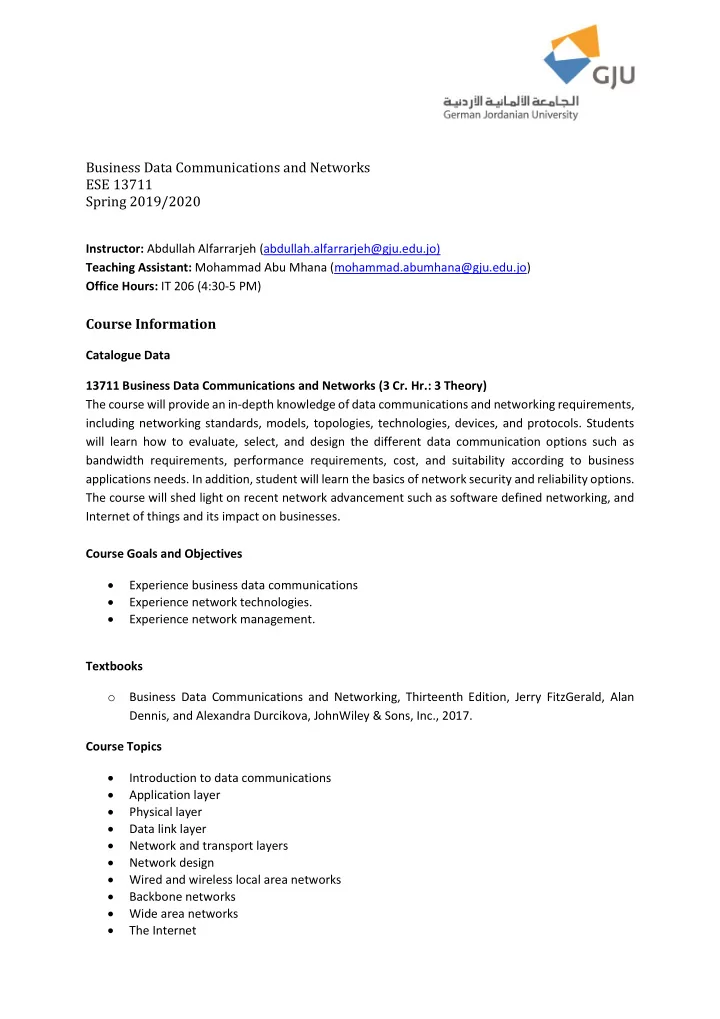

Business Data Communications and Networks ESE 13711 Spring 2019/2020 Instructor: Abdullah Alfarrarjeh (abdullah.alfarrarjeh@gju.edu.jo) Teaching Assistant: Mohammad Abu Mhana (mohammad.abumhana@gju.edu.jo) Office Hours: IT 206 (4:30-5 PM) Course Information Catalogue Data 13711 Business Data Communications and Networks (3 Cr. Hr.: 3 Theory) The course will provide an in-depth knowledge of data communications and networking requirements, including networking standards, models, topologies, technologies, devices, and protocols. Students will learn how to evaluate, select, and design the different data communication options such as bandwidth requirements, performance requirements, cost, and suitability according to business applications needs. In addition, student will learn the basics of network security and reliability options. The course will shed light on recent network advancement such as software defined networking, and Internet of things and its impact on businesses. Course Goals and Objectives • Experience business data communications • Experience network technologies. • Experience network management. Textbooks o Business Data Communications and Networking, Thirteenth Edition, Jerry FitzGerald, Alan Dennis, and Alexandra Durcikova, JohnWiley & Sons, Inc., 2017. Course Topics • Introduction to data communications • Application layer • Physical layer • Data link layer • Network and transport layers • Network design • Wired and wireless local area networks • Backbone networks • Wide area networks • The Internet
Business Data Communications and Networks ESE 13711 Spring 2019/2020 • Network Security • Network Management. Course Evaluation: Grading Component Points Date Midterm Exam 30% TBA Homework Assigngments 10% TBA Project & term paper 20% TBA Final Exam 40% TBA Suggested Journals • IEEE Transactions on Wireless Communications • Journal of Communications and Networks • IEEE Network • IEEE Transactions on Network Science and Engineering • IEEE/ACM Transactions on Networking • ACM Transactions on Internet Technology (TOIT) • ACM Transactions on Sensor Networks (TOSN) • ACM Transactions on Internet of Things (TIOT) • Communication Networks (Springer) • Journal of Network and Systems Management (Springer) • Mobile Networks and Applications (Springer) • Networking Science (Springer) • Peer-to-Peer Networking and Applications (Springer) • Wireless Networks (Springer) • Journal of Communications and Information Networks (Springer) • Applied Network Science (Springer) • Journal of Internet Services and Applications (Springer) • Journal of Network and Computer Applications (Elsevier) • Computer Networks (Elsevier) • Network Security (Elsevier)
Business Data Communications and Networks ESE 13711 Spring 2019/2020 Class Policies Class Attendance Class attendance will be taken. You must not be absent for more than 15% of the course lectures, which is 4 class lectures. Exceeding the limits in either one without a genuine excuse could fail you the complete course; The instructor reserves the right for not allowing you to attend any exam or lecture after you exceed the 15% ratio without an excuse. You are responsible for all course material and announcements covered in class. A fair amount of material will be covered in class that is not in the textbook; you are responsible for all of this material. If you miss a class, you must obtain the covered material from a willing classmate. The instructor will not be available (during office hours or other times) to repeat the material covered in class. Collaboration Policy Discussing and exchanging ideas is encouraged. You may help each other with general techniques, although specific solutions to homework assignments should be developed individually. However, except if specifically allowed by the instructor, copying from any outside sources (e.g., fellow students, Internet, etc.) on any material to be graded is not permitted and will be considered cheating. Cheating will result in failure of the assignment and perhaps the failure of the class. Each student is responsible for securing his or her work from copying. Each student is expected to abide by University policies on Academic Conduct. For other related references, refer to the Student Handbook. Due Dates All assignments must be turned in the class on the due dates for full credit. No assignments will be accepted after class on the due date. Exams All exams (including the final exam) will be in-class, closed-book exams. The final exam will be comprehensive, covering material from the entire course, although the last third of the course will be emphasized. The final exam will be held during the final exam week. Missed Exams If you have an excusable absence from an exam, your final exam grade may be counted as your missed exam grade. The instructor reserves the right to administer a make-up exam. Barring exceptional circumstances, you must contact the instructor to explain your absence within 48 hours of a missed exam. Otherwise, the absence will be considered unexcused, and your grade for that exam will be zero. Talk to the instructor if you have any foreseeable conflicts with the given exam dates. Grading Corrections
Business Data Communications and Networks ESE 13711 Spring 2019/2020 Ask the instructor for any grading correction requests within the class weeks of receiving the grade, or before the end of the semester, whichever comes first. After that, your grade will not be adjusted. If you find any mistake in grading, please let the instructor know. Your grade will not be lowered. Email Email is the preferred and fundamental method of communication between students and faculty. However, please use email wisely as it can be easily abused and misunderstood. Specifically: You may not engage in non-school activities; you may not use email to harass or abuse colleagues, faculty, or the general public. Computers You are encouraged to obtain and utilize your own laptop in connection with school activities. Printing You are strongly discouraged from printing unless it is absolutely necessary for your classwork. The university is encouraging the paperless office paradigm, and as such, you are encouraged to use email where possible.
Recommend
More recommend